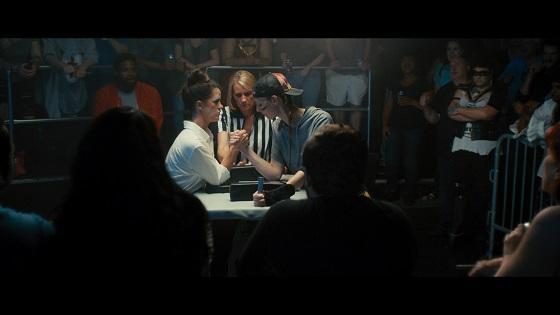
In theaters and digital VOD Friday, April 30

[Rating: Solid Rock Fist Up]
Why should guys get to have all the fun when it comes to arm wrestling, truck driving, and bar fighting? The province of Clint Eastwood, Sylvester Stallone, and devilishly clever orangutangs up till now, director Maureen Bharoocha has invaded the genre with Golden Arm, which is as much a love letter as it is a swipe at the hyper-macho bullshit that serves as the meta text to all of this. A bit broad with its characters and tone at times, to be sure, the film still manages to retain its heart, investing in its lead with all the confidence of a guaranteed winner.
Golden Arm has an easy enough set-up, with trucker and amateur arm-wrestling enthusiast Danny (Betsy Sodaro) losing a match to archrival Brenda (Olivia Stambouliah) in the opening moments. The loss leaves Danny injured, and unable to compete in the upcoming Grand Slam Championship, that is until she discovers the untapped talents of her old college buddy, Melanie (Mary Holland). When Melanie bests a random opponent in a bar one night, revealing her mythical “golden arm,” Danny tries to convince her old friend to compete in her place at the Grand Slam (and maybe even get some revenge on Brenda).
Melanie has problems of her own, though, some of which include a failing bakery business and recently filed divorce proceedings. The potential prize money from the tournament serves as one hell of an enticement, as does Danny, whose reckless enthusiasm and connections to arm wrestling guru Big Sexy (Dot-Marie Jones) convince Melanie to take the plunge. Along the way there’s a training montage, a road trip, gruesome injuries, brawls, and an entirely decent love story to bolster the effort, which is better than it has any right to be.

Buttressed by a hard-R rating and a cast with a deep improv background (many are UCB alums), Golden Arm leans into the absurdity of its conceit, taking itself far less seriously than films like Over the Top or even Every Which Way but Loose, the latter of which was silly in its own way, yet rooted in a brand of machismo that has mercifully fallen out of fashion. The snarling villain, the wild-eyed hype man, the horny love interests who immediately fall for the film’s leads: all of it seems a little broad and ridiculous until one realizes this is exactly what the movies built around Stallone or Eastwood looked like. Golden Arm flips the genders for all these character expectations, and if it ever comes off as too slapstick or outlandish, it is more of an indictment of the genre it is lampooning than of itself.
The characters understand these tropes in the moment, and while they play with them and conform to a certain degree, the movie has fun having its cake and eating it, too. Some of the best moments in Golden Arm are when the characters slow down long enough to comment on the absurdity of their situation, with one reference to the 2002 thriller Unfaithful among the funniest moments in any movie this year. And while some of the bit roles suffer from a small-scale production that may have relied on friends and family for assistance, Holland and Sodero’s work as the leads raise the tide for all the movie’s boats.
Even so, some parts work better than others, with the arm wrestling matches (presumably the centerpiece of the narrative) robbed of any real tension or gusto. Perhaps it is owing to a dearth of extras or a space big enough to build a set that can showcase the level of energy and excitement the story demands of these moments, but these scenes just don’t bring the firepower one would hope from the build-up the story establishes for them. It’s one of the only stumbles of the picture, however, which is a little rough around the edges performance-wise, yet still manages to develop enough heart to get its audience cheering for Melanie by the time she has her inevitable showdown in the championship.

The emotional connection to the narrative and Melanie is also aided by a love story that is introduced in the second act, which may have felt tacked on in a different movie, but is sold by the irresistible charm of Eugene Cordero. His Greg character develops an adorable crush on Melanie, and their moments together are some of the best of the film and allow for Melanie’s most interesting growth as a character. Whenever Golden Arm threatens to veer off into a tacky improv skit, these moments with Greg pull it back down to Earth, and the flick is better for it.
Bridesmaids for arm-wrestling, Golden Arm proves that boys aren’t the only ones who can carry a film with stupid macho humor, fast-thinking absurdist comedy, and brawny one-on-one improv energy. Light on its feet and bolstered by a star-making performance by Holland, whose pluck and commitment to the movie’s larger bit sets the tone, the movie is silly, but in possession of enough emotional bona fides to underwrite the production. Sure, some of the humor might be a little over the top, but that pedigree is exactly what the film is going for, both literally and figuratively.





Comments on this entry are closed.